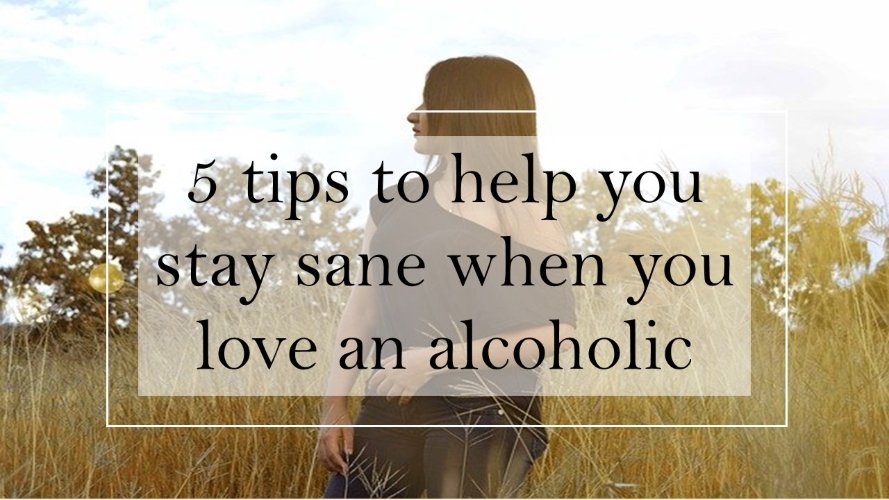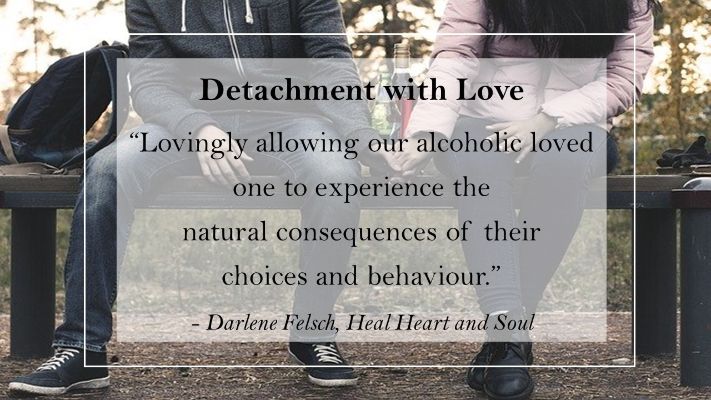
5 tips to staying sane when you love an alcoholic
For those of us who love an alcoholic, life can feel so out of control; so chaotic, that we wonder how we will ever make it through with our sanity intact.
After loving an alcoholic for over 30 years, I can tell you that you can absolutely do this! You can not only survive, but even find peace right in the middle of the chaos.
Here is 5 tips to help you.
If you would like to listen to the related podcast, there is a link at the end of this post.
1. Find a trusted friend or support group where you can talk openly
about how you feel
Often this is the hardest step, because we feel very loyal to our alcoholic loved one and we know that they would feel that we had betrayed them by telling someone else that ‘they have a problem’.
They may have even forbidden us from telling anyone and you know they may grow angry if they know you have talked to someone else.
But for your own sanity, you need to reach out to someone you trust.
The old saying ‘a burden shared is a burden halved’ is really true.
Having a loved one who drinks too much is a very lonely existence, if you have no-one to talk to.
I remember being in this exact position.
After 10 years of being an alcoholic, my husband finally took some action and booked himself into a rehab clinic, but he made me swear not to tell anyone.
We made up what we thought was a plausible story – that the kidney problems he’d had as a teenager has returned and he had gone interstate to see a specialist. We knew if we told our friends that he was in a local hospital, they would come and visit and then they would know the truth.
Our ‘secret’ would be out.
But after two weeks, my kind, supportive friends from church decided they would pay for me to fly interstate to be with him. I knew I couldn’t take their money for a lie!!!
I panicked and told them that he was doing much better and would be home in a few days.
I hated lying to these kind, wonderful people, but I felt I had no choice. I didn’t want to betray my husband by telling our friends the truth.
But it was so lonely keeping his secret.
After rehab, he stayed sober for about 2 months, then went back to drinking again.
You don’t need to suffer alone. For your own sanity, you need to reach out for support. It may be a group like Al-Anon or another kind of group, or it may just be a trusted friend.
It’s up to you whether you tell your alcoholic loved one that you have reached out for support. You certainly don’t have to. But if you do, even if they get angry, let them own their own response to the situation.
It’s time for you to take care of your own needblos – and you need support.
There is a link at the end of this blog post to listen to the podcast.

2. Stop trying to control them
Most of us who love an alcoholic spend most of our lives trying to control them:
- Controlling their alcohol use
- Controlling their money
- Controlling their whereabouts
- Controlling if they get to work on time (or if they went to work at all!)
After years and years of trying this, you finally come to realise that it simply doesn’t work.
All it does is alienate them and push them away. It may even lead to them drinking even more.
They will always find a way to drink.
Instead, invest your time and energy into looking after yourself.
3. Increase your Self-care
One day, when you have a few minutes of quiet time, make a list of the things that you enjoy; things that nurture you and recharge your batteries.
- What do you enjoy?
- Do you have any hobbies or sports or social groups?
- What makes you feel refreshed and recharged?
- What helps you to feel calm?
- What helps you to feel stronger?
- When do you feel most rested?
Only when you are taking really good care of yourself, will you be in the right space, emotionally, physically and spiritually, to deal with your alcoholic loved one.
If possible, try and do something to nurture yourself for 15 to 30 minutes per day.

Here are some examples:
- Putting on your favorite music (have a play list ready to go)
- Having a swim or spa
- Talking to a trusted friend
- Going to see a Counsellor or Psychologist
- Having a mani/pedi
- Spending time in nature (beach, forest etc)
- Spending time with animals
- Having a 10 or 20 minute power nap
- Read a good book
- Doing some meditation or yoga
- Painting, pottery, photography, scrap booking, gardening, cooking
- Just sitting in the sun and closing your eyes
- Doing some deep breathing
- Attending a support group such as Al-Anon
- Watching a favorite TV program
- Organising part of your house
- Writing in a journal
- Reading a book or listening to an audio book. One book I really enjoyed listening to on Audible was called “Codependent No More” by Melody Beattie
- Having a cup of your favorite herbal tea and drinking it in a quiet space
- Going to a garden center and buying a plant
- Reading a spiritual book, such as The Bible or other spiritual text
- Writing a list of things you are grateful for
- Getting to bed early or maybe waking up before the kids to fit in a little ‘me time’
It can be hard making time for self-care when you are dealing with the fallout from loving an alcoholic and particularly if you have young children at the same time. It’s a lot.
Life is just crazy-busy. How can you possibly find time for yourself?
We all get the same 24 hours a day. Look carefully. There will be some space that you can fit in some time for yourself.
Do you really need to be on the ‘parent committee’ at school and volunteering for the food drive at church? Do your kids really need to be doing three out of school hours activities each week?
Look hard. You will find some time somewhere.
If you have small children that need to have a baby sitter and you don’t have the money to pay for one, try and make an arrangement with another mum you know and trust to take turns minding each other’s children. You will both benefit from some much needed ‘time out’.
You will be a far better mum, partner, sister or friend by making self-care one of your highest priorities.

4. Learn to say ‘NO’
Most of us who are in a relationship with an alcoholic are people-pleases. This means we naturally hate to say ‘no’ to people.
There are many reasons for this:
- we genuinely care about people and want to help them
- we don’t want others to think badly of us
- we are afraid of other people’s anger or disappointment if we say ‘no’
- we don’t want to be rejected
- we don’t want to be unkind or rude when someone else has a need
- we think it is ‘un-Christian’ or selfish to say ‘no’
- we care what others think of us more than what we think of ourselves
- it boosts our self-esteem when we are viewed as ‘dependable’
- we want people to like us (again trying to boost our self-esteem)
Saying ‘no’ is closely linked to our ‘self-care’.
When you love an alcoholic, life is very chaotic and it can take considerable time and energy dealing with the fallout of our loved ones latest drinking episode.
This is made all the worse when we have kept our loved one’s drinking a secret. To the outside world, it may even look like we have the perfect marriage or family.
When you look at the situation honestly, you know that you can’t cope with any more on your plate, but when others don’t know the chaos and pain that we have to face on a daily basis. They may be less ‘understanding’ about why we simply don’t have to strength to do one more thing.
The bottom line is, it simply doesn’t matter of what other people think of us. Only we know what we can cope with and it is better to say a polite ‘no’ than to get ourselves in a position where we can’t cope; have too much on our plate and crash with exhaustion and depression.
Just a polite, yet firm ‘no, I’m sorry I won’t be able to do that’ is enough. If they are your true friends or colleagues, they will respect your ‘no’.
Regardless of their response, you will have the relief of knowing that you are putting your needs and the needs of your family first.
5. Try trusting in God
I don’t know whether you believe in a God – a Creator – a supreme being – that is in control of the world.
Even if you are not sure if God exists or if you believe He does exist, but that He wouldn’t be interested in you personally – I really recommend just giving trust in God a try.

I find that when I truly decide to trust in God and give Him all my worries and all my fears, it brings incredible peace. The Bible calls it “peace beyond our understanding”, meaning that you can be at peace, even in the middle of the chaos and drama of loving an alcoholic. You can read about one of my personal stories on this topic here.
If you don’t feel comfortable trying to read the Bible, just start with the Bible verses below. Slowly read each one, think about what it says, try to think of each one as being personally for you.
God’s kindness to each one of us is amazing. He wants us to take all our insecurities, worries and fears. Imagine yourself putting them in a big brown sack, giving it to God and walking away feeling light and free, leaving everything in God’s hands. It’s such a relief! Try it!
God loves you completely, just as you are.
Psalm 32:10 The Lord’s unfailing love surrounds the one who trusts in Him.
Psalm 62:8 Trust in God at all times, pour out your hearts to Him, for He is our safe place.”
Psalm 112:7 There is no need to be afraid of bad news. When you put your trust in the Lord, your heart will be steady and calm, not anxious and afraid.
Proverbs 3:5,6 Trust in the Lord with all your heart. Don’t rely on your own understanding. Give your heart fully to Him and He will show you what to do.
1 Peter 5:7 Give all your anxiety and worry to God because He cares for you.
Isaiah 26:3 When I put my trust in God, He will keep me in perfect peace.
I hope that this information has been helpful to you. I always believe that even if just one thing makes your life a little better, it’s been worth the read.
Take care, Darlene






